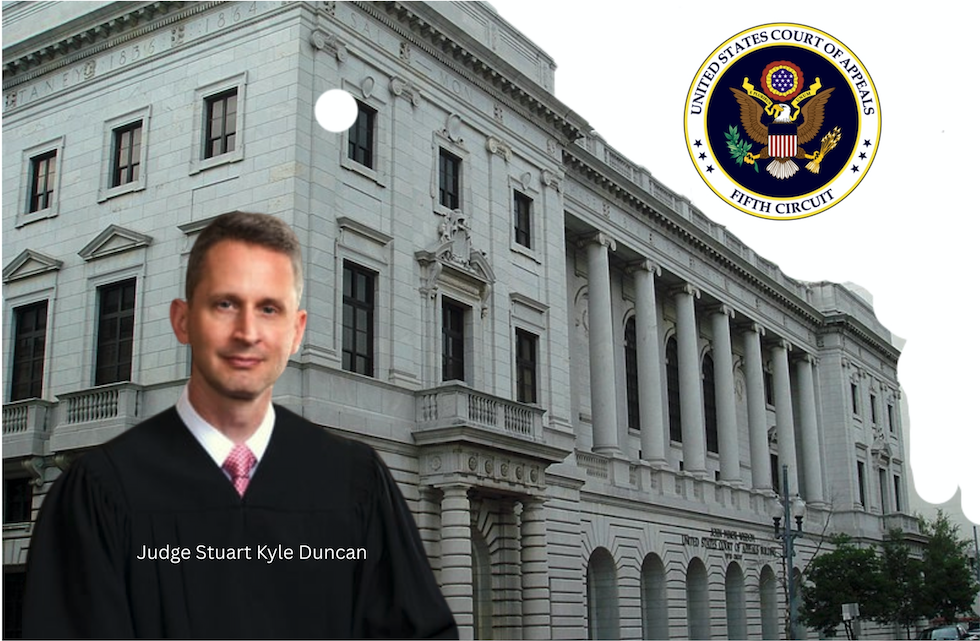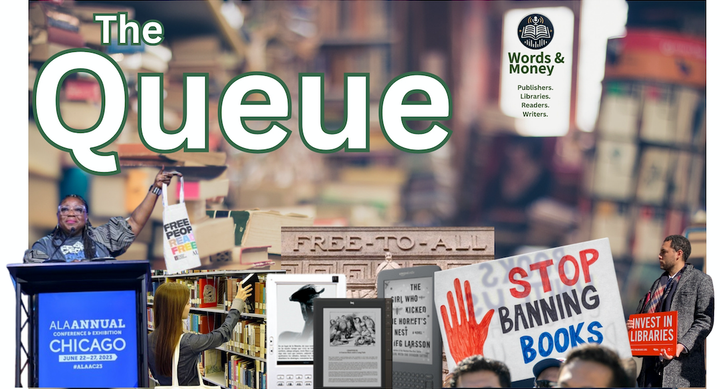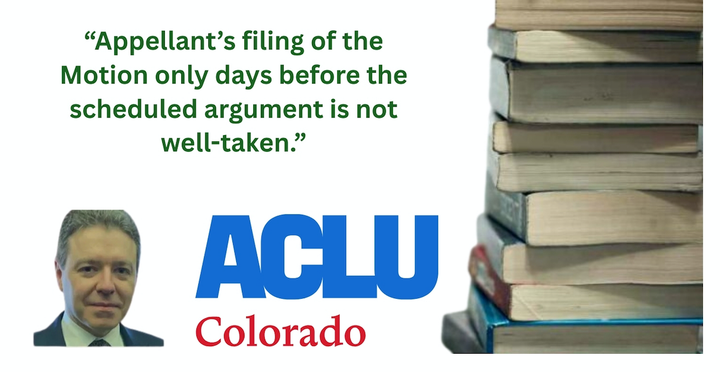In a Stunning Reversal, The Fifth Circuit Deals a Blow to the Freedom to Read
In a closely watched book banning case, the court held that library book decisions are 'government speech' and thus immune from First Amendment challenges, setting up a potential high stakes showdown at the Supreme Court.

In a highly anticipated ruling, the the U.S. Court of Appeals for the Fifth Circuit tossed out a 30-year old precedent, and held that politicians can effectively remove books from public libraries at will.
The ruling is the latest twist in Little v. Llano County, a closely-watched book banning case first filed in April 2022 by seven Llano County, Texas residents. The suit alleges that Llano County officials improperly removed some 17 books from library shelves because they disapproved of the content.
In March 2023, Judge Robert Pitman found for the plaintiffs, and issued a preliminary injunction barring the county from removing any more books while the case proceeds and ordered several books to be returned to library shelves. In June 2024, Pitman’s decision was affirmed by a split three-judge panel of the Fifth Circuit that included a fiery dissent by conservative justice Stuart Kyle Duncan.
But just a month later, on July 3, 2024, the Fifth Circuit abruptly vacated the panel’s decision, and ordered the appeal to be reheard en banc by the full court. And by a 10-7 margin, the court voted to reverse—with Duncan this time writing the majority opinion.
“Yes, Supreme Court precedent sometimes protects one’s right to receive someone else’s speech. But plaintiffs would transform that precedent into a brave new right to receive information from the government in the form of taxpayer-funded library books. The First Amendment acknowledges no such right,” Duncan wrote for the majority. “That is a relief, because trying to apply it would be a nightmare. How would judges decide when removing a book is forbidden? … The only sensible course—and, happily, the one supported by reams of precedent—is to hold that the right to receive information does not apply here. A plaintiff may not invoke that right to challenge a library’s decisions about which books to buy, which books to keep, or which books to remove.”
Notably, the appeals court, widely considered to be the most conservative court in the nation, went far beyond the narrow question before them—whether Pitman's preliminary injunction abused his discretion—to reverse its own three-decade unanimous holding in Campbell v. St. Tammany Parish School Board, a 1995 First Amendment decision involving the attempted removal of a book from a public school library that has long served as an anti-censorship bulwark for librarians.
“True, one of our decisions—Campbell v. St. Tammany Parish School Board—suggested students could challenge the removal of a book from public school libraries. But Campbell was based on a mistaken reading of precedent,” Duncan wrote. “We therefore overrule Campbell.”
Furthermore, seven judges of the Fifth Circuit agreed that library book decisions are “government speech” and therefore not subject to Free Speech challenges. That finding stands as a massive extension of the government speech doctrine, which holds that the First Amendment does not impose “a requirement of viewpoint-neutrality” on speech undertaken by the government.
“Many precedents teach that someone engages in expressive activity by curating and presenting a collection of third-party speech,” Duncan held. “In the same way, a library expresses itself by deciding how to shape its collection.”
In a grave misunderstanding of how libraries operate, Duncan asserted that a librarian choosing to buy a book and place it on library shelves is akin to a government endorsement. “What the library is saying is: ‘We think these books are worth reading,’” Duncan observed.
While the court's holding that there is no "right to receive" information in libraries is not explicitly tied to the plurality of Fifth Circuit judges who agreed that library book decisions are government speech, that is a distinction without difference, the dissenting judges argued.
"By eliminating the public’s right to challenge government censorship of public library books, our court’s holding becomes a Trojan horse for the government speech doctrine that fails to command a majority in its own name," reads a dissent penned by judge Stephen Higginson. "The majority opinion elucidates no functional difference between its holding that the public has no First Amendment right to challenge the government’s removal of public library books, no matter the reason, and its ostensible plurality holding that the government may 'speak' by removing library books for any reason, without First Amendment restraint."
In a footnote, the dissent frames this lack of distinction as an "attempted First Amendment collapse—supplanting free speech with government speech," and sets up a high stakes Supreme Court showdown, as it conflicts with decades of precedent, as well as a recent decision by the Eighth Circuit in a challenge over Iowa’s book banning law SF 496.
In blocking portions of the Iowa law, a three-judge panel of the Eighth Circuit soundly rejected the idea that the government speaks through the books librarians and educators choose to make available, noting that libraries by definition should offer diverse opinions, and not just state-approved content.
“A well-appointed school library could include copies of Plato's The Republic, Machiavelli's The Prince, Thomas Hobbes's Leviathan, Karl Marx and Freidrich Engels's Das Kapital, Adolph Hitler's Mein Kampf, and Alexis de Tocqueville's Democracy in America,” the Eighth Circuit held. "If placing these books on the shelf of public school libraries constitutes government speech, the State 'is babbling prodigiously and incoherently.'"
Furthermore, in July 2023, federal judge Timothy L. Brooks also forcefully rejected the state’s suggestion that public librarians function as state actors, in a decision blocking portions of Arkansas's Act 372.
Though libraries may be funded by taxpayers and overseen by local and state officials, “the public library is not to be mistaken for simply an arm of the state," Brooks observed. "By virtue of its mission to provide the citizenry with access to a wide array of information, viewpoints, and content, the public library is decidedly not the state’s creature; it is the people’s."
In his majority opinion, Duncan proclaimed the Eighth Circuit’s view to be an error.
“The library is not babbling incoherently in the voices of Captain Ahab, Hester Prynne, Odysseus, Raskolnikov, and Ignatius J. Reilly. Rather, the library speaks by selecting some books over others and presenting that collection to the public,” Duncan concluded, again leaning on a mistaken view of how libraries operate. “Public libraries used to exclude most novels, which were thought bad for morals. Today a library would not think of excluding Fifty Shades of Grey. But what has not changed is the fact, as true today as it was in 1850, that libraries curate their collections for expressive purposes. Their collection decisions are therefore government speech.”
In a coup-de-grace, Duncan belittled those arguing for the freedom to read.
“Finally, we note with amusement (and some dismay) the unusually over-caffeinated arguments made in this case,” Duncan wrote. “Take a deep breath, everyone. No one is banning (or burning) books. If a disappointed patron can’t find a book in the library, he can order it online, buy it from a bookstore, or borrow it from a friend. All Llano County has done here is what libraries have been doing for two centuries… If you doubt that, next time you visit the library ask the librarian to direct you to the Holocaust Denial Section.”
Major Ramifications
Beyond Llano County and the three states covered by the Fifth Circuit (Louisiana, Mississippi, and Texas) the decision is likely to have major ramifications amid an ongoing surge in politically-motivated book bans. At the very least, much of the litigation now pending across the nation will likely be extended by years, pending a potential Supreme Court showdown. Furthermore, would-be book banners in other circuits are likely to be emboldened by the decision after several high profile legal defeats in recent months.
At the September 24, 2024 oral argument before the Fifth Circuit, attorney Matthew Borden, representing the plaintiff library patrons, warned against discarding Campbell, a precedent that has hardly been controversial since it what issued three decades ago.
“The First Amendment prevents the government from getting rid of ideas that it disagrees with. That was the standard that this Court set out in Campbell," Borden told the court. Suddenly overthrowing Campbell, he added, could undermine a litany of cases that have protected diversity in library collections, he suggested, and "would turn libraries from institutions of knowledge and education and learning and ideas into political institutions."
In his dissent, Higginson, joined by several others, blasted the majority opinion.
"Turning freedom of speech into government speech is more than a sleight of hand. It results from the majority ignoring preliminary facts found by a district court and repudiating half-century-old Supreme Court authority," Higginson writes. "Having done so, the majority grounds its holding that library patrons
'cannot invoke the right to receive information to challenge' book removals
as a matter of law on a faulty premise: that the 'First Amendment does not
give you the right to demand' that the government 'keep' particular books
in the library. This construction grossly misapprehends the right identified in Pico and Campbell and the right asserted by Plaintiffs here. It is not an affirmative right to demand access to particular materials. Rather, consistent with the First Amendment’s text and longstanding Supreme Court doctrine, Plaintiffs assert a negative right against government censorship that is targeted at denying them access to disfavored, even outcast, information and ideas."
Higginson went on to criticize what he characterizes as the majority's overreach in using a narrow case to dramatically expand the government's ability to censor.
"Indeed, the majority concedes by silence that the district court did not clearly err in finding that Defendants’ removal decisions likely were motivated by discrimination against certain ideas and a desire to limit access to those ideas,” Higginson writes. “Nonetheless, our court instead announces a new abridgement of the First Amendment, holding that public library patrons may not challenge even politically motivated book removals. Hereafter across Texas, Louisiana, and Mississippi, it simply does not matter legally if public officials, motivated by political hostility, target and remove books they deem inappropriate or offensive, in order to deny the public access to the information and ideas therein.”
In comments last fall, EveryLibrary founder John Chrastka said that if the Fifth Circuit accepted the government speech argument, it would be as big as overturning Miller, the 1939 Supreme Court case that sets forth a test for what constitutes obscenity.
"Allowing the Government Speech Doctrine to creep into the management of public libraries will upend everything that a public library is supposed to be," EveryLibrary reps said in a statement ahead of last year's oral argument. "The outcome of this case will set a crucial precedent for the role of libraries in our democratic society."
In a statement, Elly Brinkley, Staff Attorney for U.S. Free Expression Programs at PEN America, said the Fifth Circuit decision was "astounding."
“The court’s embrace of the dangerous argument that the curation of library books constitutes 'government speech' immunizes state censorship from First Amendment scrutiny, essentially giving the government free rein to exert ideological control over what citizens can read in their public libraries," Brinkley said. "At a time when censorship is running rampant at both state and federal levels, this opinion arms the government with a powerful new and fallacious weapon to erode the free exchange of ideas, a foundation of our democracy. It must be overturned.”
This is a developing story. We will update with reactions as the come in.


